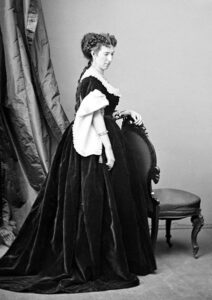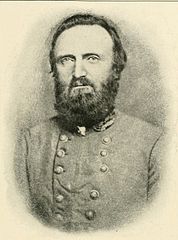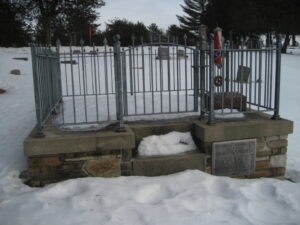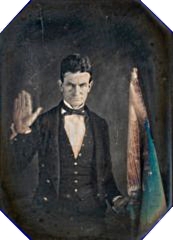Isabella Maria Boyd
Isabella Maria Boyd ran a hotel for her father in Front Royal, Virginia. Front Royal is located at the northern end of the Civil War-strategic Shenandoah Valley. Belle Boyd was a Confederate spy. Most often she was called Belle, but she had other names too. She was called; the “Siren of the Shenandoah,” the “La Belle Rebelle,” the “Rebel Joan of Arc,” the “Amazon of Secessia,” and the “Cleopatra of the Secession.” She shrewdly used her feminine charm and appeal to gather information from unwitting Union officers and troops staying at her father’s hotel.
Belle was described as, “without being beautiful, she is very attractive…quite tall…a superb figure…and dressed with much taste.” She was not unattractive, but she wasn’t a raving or natural beauty. Union officers and soldiers were vulnerable to Belle’s playful toying with them. Their loose lips would tell Confederate Belle information she should not know.She was born on May 4, 1844, to a wealthy family in Martinsburg, Virginia. Martinsburg would later become part of West Virginia. When Yankee troops came to Martinsburg in early July 1861, a Billy Yank who’d had too much booze allegedly insulted Belle’s mother. Belle shot and killed him. After the Civil War, Belle wrote of this incident in her memoirs. She wrote the Yankee had, “addressed my mother and myself in language as offensive as it is possible to conceive. I could stand it no longer…we ladies were obliged to go armed in order to protect ourselves as best we might from insult and outrage.” It should be noted that in her memoirs Belle sometimes had a tendency to exaggerate. The commanding officer of the dead Billy Yank made an investigation into the matter and decided that Belle had, “‘done perfectly right.” Belle was not punished for killing the Yankee.
A Spy For Stonewall Jackson
Seventeen-year-old Belle soon became a Confederate spy. Having lived in western Virginia and in Front Royal, Belle had a good knowledge of the area and its geography. This was valuable knowledge to the Confederates. As a spy, Belle was a courier for Union troops and had access to Union camps. She always had her eyes and ears open for information that would help the Confederates.Belle claimed in her memoirs that while visiting relatives at their home in Front Royal she spied through a closet’s peephole on a Yankee Council of War meeting. She learned that Union Major General Nathaniel Banks’ troops would be advancing east to Front Royal.
Belle rode fifteen miles in the night to the Shenandoah Valley to convey that information to General Thomas Jonathan “Stonewall” Jackson who was on his 1862 Valley Campaign.
A few weeks later, Belle once again provided Stonewall Jackson with timely information. This time it was about Union troop positions before Stonewall made his attack on Front Royal. On this occasion, “La Belle Rebelle” risked her life crossing over the battlefield through Union lines. She wrote of the experience, “the Federal pickets…immediately fired upon me…my escape was most providential…rifle-balls flew thick and fast about me…so near my feet as to throw dust in my eyes…numerous bullets whistled by my ears, several actually pierced different parts of my clothing.” Belle Boyd was a brave young woman.
Stonewall Jackson won at Front Royal and in a personal letter to Belle, he commended her for her spying help and courage. Stonewall made Belle Boyd an honorary captain in an aide-de-camp position, and she was awarded the Southern Cross of Honor.
Jail, England, Capture, Canada, Marriage, Memoir
Although Belle was arrested several times she avoided jail until July 29, 1862. On the order of United States Secretary of War Edwin Stanton, Belle was jailed at the Old Capitol Prison in Washington after a lover blew the whistle on her. Belle’s jail time was short when a prisoner exchange got her out of jail within a month. She was arrested and sent to jail for a second time in July 1863. This time she spent a longer time in jail and was not released until the following December. Belle was banished to the South. At the time she was suffering from typhoid fever.To recover her health and to continue her spying service to the Confederacy, Belle sailed for Europe on May 8, 1864. On this voyage, she carried letters from Confederate President Jefferson Davis that she was to deliver to foreign dignitaries. A Union warship intercepted the blockade runner Belle was aboard and she was captured. Her shrewdness and beguiling feminine ways pay off again for her as she charms the blockade runner’s crew and officers. Apparently one officer, in particular, fell under Belle’s spell and fortuitously for her, she is left in Canada. Again, the “La Belle Rebelle” is not punished. Belle then successfully continues her journey to England.
In England, Belle marries Samuel Hardinge, Jr. on May 25, 1864. Isn’t it an interesting coincidence that Samuel just happened to be the Union naval officer who seized the blockade runner Belle was a passenger on? Imagine that! The reader is free to hazard a guess, to imagine, and to read between the lines about Samuel Hardinge, Jr. and the charming Belle. Consider too, how Belle was set free in Canada after her capture.
Samuel returns to the United States and is imprisoned under suspicion of treason. After all, he had captured Belle Boyd, a known Confederate spy heading for England who was caught carrying letters from Jefferson Davis, but he sets her free safely in Canada. Then, he marries her. Nevertheless, in the United States Samuel Hardinge, Jr. is set free from prison, then he soon dies.
Back in England, “La Belle Rebelle” is expecting a child and Samuel is the father. Perhaps Belle and Samuel’s story is clearer now. She gives birth to a daughter. With help from an established English journalist, she writes a book, a two-volume memoir titled Belle Boyd in Camp and Prison. In her memoir, Belle tells of her Civil War spying exploits and adventures.
Actress and More Marriages
Belle becomes an actress in 1866 and then returns to the United States in 1867 where she continues her acting career. In March 1869, Belle marries John Swainston Hammond, an Englishman who fought for the Union in the Civil War. Belle and John have two sons and two daughters. Their union did not last, they divorce in November 1884. Belle is not single for very long. The following January Belle marries actor Nathaniel Rue High, a young Ohioan. It seems that Belle got around. Belle now begins a new career touring the country speaking and lecturing about her Civil War adventures as a Confederate spy.Death
Isabella Maria Boyd dies of a heart attack in Wisconsin on June 11, 1900. She rests in peace at Kilbourn (now Spring Grove) Cemetery in Wisconsin. The Confederate spy, the “Siren of the Shenandoah,” the “La Belle Rebelle,” the “Rebel Joan of Arc,” the “Amazon of Secessia,” or the “Cleopatra of the Secession,” is buried in Yankee soil.
Learn Civil War History Podcast: Belle Boyd, the “La Belle Rebelle” – A Confederate Spy
Isabella Maria Boyd ran her father’s hotel in Front Royal, Virginia. Front Royal is at the northern end of the Civil War-strategic Shenandoah Valley. Belle Boyd was a Confederate spy. Most often she was called Belle, but she had other names too. She was called; the “Siren of the Shenandoah,” the “La Belle Rebelle,” the “Rebel Joan of Arc,” the “Amazon of Secessia,” and the “Cleopatra of the Secession.” Belle was described as, “without being beautiful, she is very attractive…quite tall…a superb figure…and dressed with much taste.” She was not unattractive, but she wasn’t a raving beauty. She shrewdly used her feminine charm and appeal to gather information from unwitting Union officers and troops staying at her father’s hotel. Union officers and soldiers were vulnerable to Belle’s playful toying with them. Their loose lips would tell the Confederate spy Belle information she ought not know. Having lived in western Virginia and in Front Royal, seventeen-year-old Belle had a good knowledge of the area and its geography. This was valuable knowledge to the Confederates and Belle became a Confederate spy. Belle was a courier for Union troops and had access to Union camps. As a spy, she always had her eyes and ears open for information that would help the Confederates.




